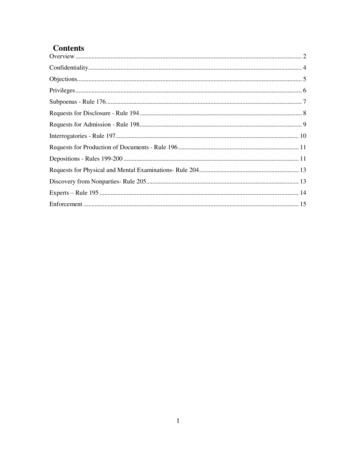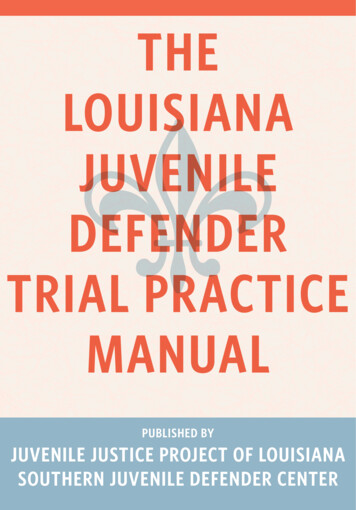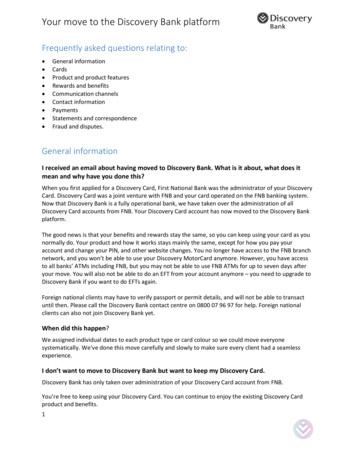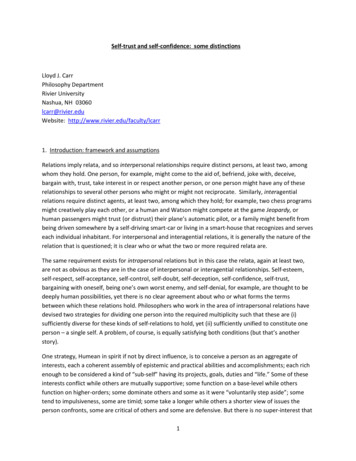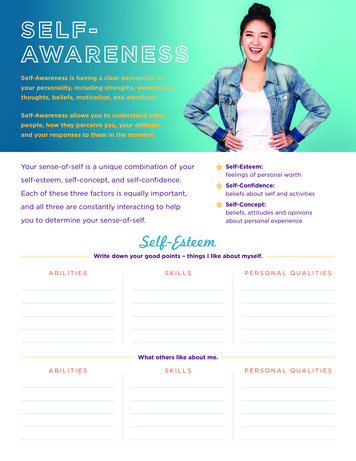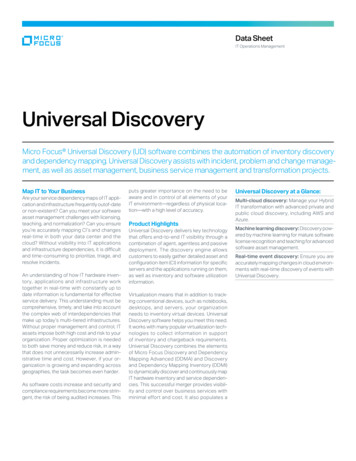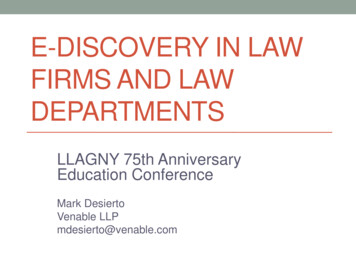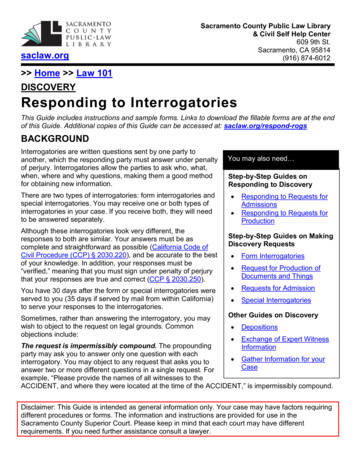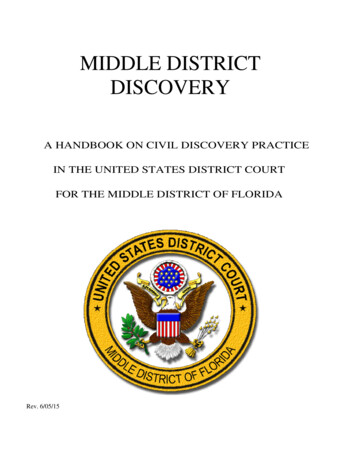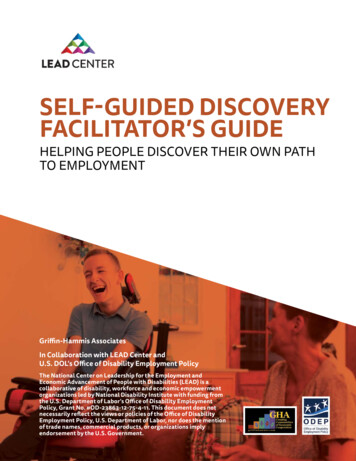
Transcription
SELF-GUIDED DISCOVERYFACILITATOR’S GUIDEHELPING PEOPLE DISCOVER THEIR OWN PATHTO EMPLOYMENTGriffin-Hammis AssociatesIn Collaboration with LEAD Center andU.S. DOL’s Office of Disability Employment PolicyThe National Center on Leadership for the Employment andEconomic Advancement of People with Disabilities (LEAD) is acollaborative of disability, workforce and economic empowermentorganizations led by National Disability Institute with funding fromthe U.S. Department of Labor’s Office of Disability EmploymentPolicy, Grant No. #OD-23863-12-75-4-11. This document does notnecessarily reflect the views or policies of the Office of DisabilityEmployment Policy, U.S. Department of Labor, nor does the mentionof trade names, commercial products, or organizations implyendorsement by the U.S. Government.
FORWARDThe Office of Disability Employment Policy (ODEP) at the U.S. Department of Labor (DOL) and the LEADCenter are pleased to release this Facilitator’s Guide to Self-Guided Discovery. For many years, ODEP hasworked to strengthen the capacity of the nation’s workforce development system to improve employmentoutcomes for people with disabilities, using Customized Employment (CE) approaches as a universalstrategy. With the implementation of the Workforce Innovation and Opportunity Act (WIOA) and ongoingsystems change efforts like Employment First, formal adoption and implementation of CustomizedEmployment policies and practices are increasingly occurring in state and local age ncies to improveemployment outcomes for individuals with disabilities and other significant barriers to employment.Customized Employment’s signature strategy, Discovery, offers an approach for job seekers with barriersto employment that is consistent with some of the most widely accepted strategies for successful careerdevelopment.Every job seeker begins or continues their career with many experiences, circumstances, and purposes thatare unique to them. Therefore, everyone’s Discovery profile will be just as unique. A variety of Discoveryapproaches have been designed to match the amount of support a job seeker may need. Some people mayrequire a significant amount of support, benefiting most from an individually facilitated process. Othermay do best in small groups, using Guided Group Discovery. Some people may benefit from a self-guidedapproach, as described in this Guide, to identify their own ideal conditions of employment. When done well,Discovery leads to employment, often with a customized position. For everyone, the process assists jobseekers in identifying employment that would be a good fit both for them and for an employer.This Facilitator’s Guide to Self-Guided Discovery adds to the foundation of Discovery approaches andresources. It is an essential user-friendly tool designed to train facilitators to guide people through theSelf-Guided Discovery process. This Facilitator’s Guide to Self-Guided Discovery would not have beenpossible without the LEAD Center and Griffin-Hammis Associates/Center for Social Capital. We also aregrateful to the state teams that participated in the LEAD Center’s Self-Guided Discovery Pilot from Georgia,Arkansas and Rhode Island. Each state team consisted of staff from multiple state and local agencies andorganizations including the workforce system, vocational rehabilitation, community employment providers,schools, community colleges, and many other partner community agencies. These teams learned andimplemented Self-Guided Discovery strategies to support job seekers with disabilities to take the next stepforward in their career.This Facilitator’s Guide to Self-Guided Discovery can be downloaded from the LEAD Center’s website atwww.leadcenter.org.Office of Disability Employment PolicyU.S. Department of LaborPage 2Self-Guided Discovery
INTRODUCTIONThis Facilitator’s Guide provides a step-by-step guide through each stage of Discovering Personal Genius and highlights the ways a self-directed or family-guided approach may differ from a guided or facilitatedapproach. The similarities between the two approaches are also explored.Discovering Personal Genius (DPG) is the name given to the Discovery process developed by Griffin-HammisAssociates (GHA). GHA’s work builds on the approaches put forth by Marc Gold Associates and otherswho made foundational contributions to person-centered employment approaches and the concept ofDiscovery as the first step in Customized Employment. Discovery is a functional assessment designed tolearn “who” someone is; it takes inventory of a person’s skills, interests, experiences, relationships, etc.;and creates a positive personal employment profile. This positive profile underlies the plan to contactbusinesses where the job seeker and company both benefit when the individual becomes an employee. Insome cases, Discovery may lead someone down the path to self-employment as the best option.Although we refer to this process as “Self-Guided Discovery,” almost everyone will benefit from theassistance of someone who is trained and skilled in these techniques (i.e., someone to help them discovertheir personal genius and assist them in connecting with a business that could benefit from having thatperson as an employee). A simple fact is that no one succeeds alone. We all benefit from a second set ofeyes or a different perspective. This Facilitator’s Guide is designed to provide a format and advice for thosewho assist people on their discovery journey. The basic format for completing Self-Guided Discovery canbe found in “Self-Guided Discovery : Customized Employment Planning Tools for Individuals & Families,”developed by Griffin-Hammis Associates, Inc. which is located in Appendix A of this Guide.ONLY PEOPLE WHO HAVE BEEN THOROUGHLY TRAINED AND ARE SKILLED IN THE TOOLS ANDTECHNIQUES OF DISCOVERY SHOULD CONSIDER TAKING ON THE ROLE OF A FACILITATOR.There are a few organizations you can contact to find professionals who are trained in CustomizedEmployment and Discovery: Griffin-Hammis Associates: http://www.griffinhammis.comMark Gold and Associates: http://www.marcgold.comTransCen, Inc.: https://www.transcen.orgAssociation of Community Rehabilitation Educators: http://www.acreducators.orgIn addition, facilitating or assisting someone with Self-Guided Discovery is different than facilitating amore guided approach. As stated in Self-Guided Discovery: Customized Employment Planning Tools forIndividuals and Families:“Not everyone requires a great deal of support from an employment consultant to discover his or her ownpersonal genius. In many cases, Discovery can be done effectively by an individual job seeker with minimalguidance and support from an employment consultant, friend, or family member.Page 3Self-Guided Discovery
For instance, self-directed or self-guided discovery may be applicable for: People with a previous career whorecently acquired a disability, who areinterested in staying at work or returningto work.People with a disability who have acollege degree, technical certificate,advanced training, or well-developedskills in a specific area.Veterans, including War WoundedVeterans, who were trained in specificskills in the military. People with sensory disabilities who may fall intoone of the categories listed above.People who want to control their Discovery andemployment planning process, rather than havingit facilitated by someone else.Job seekers in the Workforce System who havea disability but may not qualify for VocationalRehabilitation or other government-assistedemployment services.Self-Guided Discovery is also effective for families with sons or daughters ranging from early childhood totheir school transition years. One benefit of Self-Guided Discovery for families is the ability to engage in theprocess over the course of several years. The process can guide families in teaching their child functionalskills that are valuable later in life and that enhance employability. The process also guides educationalefforts including work experiences, academic s, skills training, after-school employment, and school-towork transition. Self-Guided Discovery is an effective way to put the control of one’s career developmentsquarely in the hands of the job seeker or family."Self-Guided Discovery begins via an initial consultation with someone fully trained and competent inDiscovery. That person provides the job seeker/family/friends/paid supports with the framework andnecessary materials to get started. That initial consultation also includes an overview of the DPG processand how DPG leads to career or small business development. As the employment seeker or family embarkson their Discovery journey, the Discovery Guide is helpful in reviewing information and generating ideas andother support strategies as requested by the individual or family.The principle targets of Discovery are: To create a career path using Customized Employment To create a solid Vocational Profile that includes: Evidence supporting at least 3 Vocational Themes Determining an ecological match (Ideal Conditions of Employment) Listing an individual’s Skills and Tasks that other people would find useful (competencies)Success is enhanced when there are other people assisting with or reviewing the process. Individual jobseekers or families might consider inviting strong allies to be part of a Discovery Team. The Team servesexclusively in an advisory role. They contribute by providing information; generating ideas; reviewing theDiscovery Staging Record (DSR), which is a series of tracking tools used to stage, structure, capture, andrecord the major events of Discovery; linking the employment seeker with community resources andmore. DSR forms are located in Appendix C. This process does not require a large team or one comprised ofprofessionals. In fact, we recommend minimizing the number of human service professionals on the team.Instead, think about friends, family, and other community members who the individual would consider his/her supporters to help in the process of Discovery.Page 4Self-Guided Discovery
VALUES AND PRINCIPLES OF DISCOVERING PERSONAL GENIUSDiscovery is a values-based process. It is critical that those who assist people with their paths of Discoveryknow and abide by these guiding principles and values. Inspired by the Values and Ethics of WRAP from the Copeland Center on Wellness and Recovery (https://copelandcenter.com), acceptance of andcommitment to these values and principles is a prerequisite to the facilitation of Discovery.1.Each stage of the process supports thepremise that there are unlimited ways in theworld to make a living and there is a place foreveryone to contribute and earn a living.2. All people are viewed as employable and canmake a contribution to the economic wellbeing of a business.3. Discovery promotes self-determination,personal responsibility, and self-advocacy ascritical elements.4. Employment is essential to wellness and goodhealth.10. There are no “readiness” qualifications –competence is assumed.11. Individuals are assisted to explore choices andoptions, and are not expected to find simple,final answers.12. All participation is voluntary.13. It is understood that each person is the experton him/herself.14. The focus is on strengths and not on deficits.15. Clinical, medical, and diagnostic language isavoided.5. DPG facilitators provide guidance, not control.16. Testing and vocational evaluations are of littleor no value.6. The individual job seeker agrees to take actionon his/her plan.17. The process emphasizes strategies that aresimple and safe for anyone.7.18. Difficult feelings and behaviors are seen asnormal responses to difficult circumstances.The individual must be the key decision makerand must own his/her path of discovery.8. The individual job seeker is treated as anequal.19. Each person brings creativity and insight totheir path of Discovery.9. We do not try to change someone, but accepteach person as they are.20. No two paths of Discovery will be the same.THIS IS THE MOST IMPORTANT VALUE PROVIDED BY PEOPLE WHO ASSIST OTHERS WITH THEIRPATHS OF DISCOVERY. GUIDANCE MEANS: Bringing a thoroughunderstanding ofDiscovery and CustomizedEmployment to thediscussionListening withoutjudgmentNot imposing one’spersonal values or opinionson the job seekerBeing precise and clearwhen communicatingOffering constructivefeedbackPage 5 Brainstorming with thejob seeker (and team ofsupporters)Seeking clarity (beingcertain the job seeker isunderstood)Problem solvingSupporting the decisionmaking needs of theindividualKeeping the process ontrack and moving forwardin a timely fashionEngaging team membersthroughout the process Following up with thejob seeker on timelines,appointments, meetings,etc.Assisting with thedevelopment of resumes,representationalportfolios, etc.Using creative means tohelp individuals list theirskills, interests, wellnesstools, conditions ofemployment, etc.Focusing on “what getsdone” (concrete actions)Self-Guided Discovery
FACILITATIONFacilitation is a skill that can be learned and developed through practice. Some people are natural bornfacilitators. Even so, knowing principles and practices of facilitation is something that even the mostaccomplished professionals find valuable. Facilitation comes from the French word, facile, which meanseasy or effortless. The facilitator’s job is to make the process easy, understandable, and gratifying.Skilled facilitators understand that they must follow a set of principles and values that keep the processon track, assure the inclusion of all participants, and focus on the creation of tangible and actionableoutcomes.Successful facilitators must be humble and never forget that: They are servants (of a group or, in this case, They must have the ability to ask good,an individual job seeker).probing questions. They must prepare and plan ahead – a great They must respect the importance of nuancedeal of work will be done outside of meetingsand subtlety, although you can find clueswith a group or individual.and direction in the obvious. Most of thericher discoveries reside in the nuances and They must hone their skills at eliciting inputsubtleties of a situation.from all concerned – being sure that everyone They must learn to work with the person asis heard and that their ideas are recorded.they are and strive to help each person be They must become expert listeners.their best. They must become effective negotiators They must know when enough is enough forand look for common ground withoutmeetings and for the process as a whole. Avoidcompromising individuality.the trap of “over-analysis paralysis.”Successful negotiation includes: Having high expectations for the outcomes ofthe process. Negotiating the power necessary to beeffective. Remaining neutral on content (mostly), butnot neutral on the process. Practicing “leadership by consent” (i.e., ifa leader naturally appears, the full team,including the job seeker MUST agree).Promoting participation within a structuredprocess.Effectively dealing with challenges.The facilitator should be the champion of high expectations. Expect the best and hold everyone to thatstandard. Skilled facilitators negotiate to create a win-win situation for the job seeker and those gatheredto support him/her. A facilitator must know the process of discovery and remain neutral about contentwithout allowing the process to be compromised. Discovery is a structured process that encouragesparticipation. Skilled facilitators know how to elicit participation and deal with the challenges that arebound to arise.Page 6Self-Guided Discovery
Common Challenges Facilitators Face: Recording the in
Discovery leads to employment, often with a customized position. For everyone, the process assists job seekers in identifying employment that would be a good fit both for them and for an employer. This Facilitator's Guide to Self-Guided Discovery adds to the foundation of Discovery approaches and . resources. It is an essential user-friendly .
